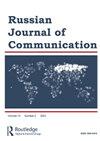第一部神经歌剧《Noor》:透明的大脑与人文伦理的终结?
Q1 Social Sciences
引用次数: 1
摘要
2016年5月18日,由俄罗斯媒体诗人创作的世界首部神经歌剧《Noor》在香港Run Run创意媒体中心首演。这部歌剧的视觉、音乐和歌词都是由佩戴无线脑电图装置的表演者的脑电波激活的。Noor讨论了理想主义、牺牲和自我自治等问题,这些问题都是在日益侵入和复杂的数据技术的监视下进行的。本文章由计算机程序翻译,如有差异,请以英文原文为准。
The first neuroopera ‘Noor’: transparent brain and the end of humanistic ethics?
ABSTRACT Noor, the first in the world neuro opera with a libretto by a Russian media poet premiered in Run Run Creative Media Centre in Hong Kong on 18 May 2016. The opera features visuals, music and libretto activated by the brainwaves of the performer wearing a wireless EEG set. Noor discusses the issues of idealism, sacrifice and the autonomy of self under the surveillance of increasingly invasive and sophisticated data technologies.
求助全文
通过发布文献求助,成功后即可免费获取论文全文。
去求助
来源期刊

Russian Journal of Communication
Social Sciences-Political Science and International Relations
自引率
0.00%
发文量
0
期刊介绍:
Russian Journal of Communication (RJC) is an international peer-reviewed academic publication devoted to studies of communication in, with, and about Russia and Russian-speaking communities around the world. RJC welcomes both humanistic and social scientific scholarly approaches to communication, which is broadly construed to include mediated information as well as face-to-face interactions. RJC seeks papers and book reviews on topics including philosophy of communication, traditional and new media, film, literature, rhetoric, journalism, information-communication technologies, cultural practices, organizational and group dynamics, interpersonal communication, communication in instructional contexts, advertising, public relations, political campaigns, legal proceedings, environmental and health matters, and communication policy.
 求助内容:
求助内容: 应助结果提醒方式:
应助结果提醒方式:


